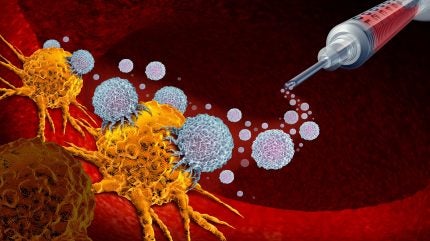

Moderna’s mRNA cancer vaccine for solid tumours shows early signs of promise in interim data from a Phase I study.
The messenger ribonucleic acid (mRNA) specialist announced the vaccine has shown early signs of an immune response against cancer, with the shot triggering cancer-killing cells.

Discover B2B Marketing That Performs
Combine business intelligence and editorial excellence to reach engaged professionals across 36 leading media platforms.
Moderna is due to present the data from the first-in-human study of mRNA-4359 on 14 September at the European Society of Medical Oncology meeting, taking place between 13 September and 16 September in Barcelona, Spain.
The Phase I/II trial (NCT05533697) is a dose escalation study for mRNA-4359 in 19 patients with lung cancer, melanoma and other solid tumours.
Eight of 16 patients who could have their responses evaluated did not see any increase in tumour size and no new tumours have appeared.
Data showed the mRNA vaccine activated the immune system to recognise two proteins of interest, PD-L1 and IDO1. This should trigger a response of immune cells to kill cancer cells, as well as the body reducing other immune cells which can prevent the immune system from fighting cancer.

US Tariffs are shifting - will you react or anticipate?
Don’t let policy changes catch you off guard. Stay proactive with real-time data and expert analysis.
By GlobalDataThe vaccine was safe and well tolerated in the first cohort, with adverse events (AEs) including fatigue, injection site pain and fever.
Researchers are asking for the interim data to be treated with caution at this early stage due to the small sample size and primary endpoint being safety and dose-determining.
Moderna’s senior vice president and head of development, therapeutics and oncology Dr Kyle Holen said: “We are encouraged by the Phase I results of mRNA-4359, which demonstrate its potential to elicit strong antigen-specific T-cell responses while maintaining a manageable safety profile.
“This novel approach could be a key component in shifting the tumour microenvironment toward a more immune-permissive state, offering potential hope for patients with advanced solid tumours.”
The Phase I trial was designed to test the safety and tolerability of the immunotherapy, and secondary and tertiary objectives were to assess the radiographic and immunological responses.
The Phase II portion of the trial continues to recruit patients with melanoma and lung cancer in combination with Keytruda (pembrolizumab). Keytruda is an anti-programmed death receptor-1 (PD-1) immunotherapy.
Currently, all sites in the study have been in the UK but the Phase II trial will also include patients in Spain, the US and Australia.
Cancer space filling up with mRNA vaccines
Moderna’s mRNA solid tumour candidate is just one of many cancer vaccines in clinical trials around the world.
Moderna and Merck are running a Phase III trial of an mRNA melanoma vaccine mRNA-4157 (V940) plus Keytruda in melanoma.
BioNTech and Genentech are also running a Phase I trial in collaboration with the UK National Health Service (NHS) of a personalised cancer vaccine. BioNTech is also trialling its vaccine BNT116 for patients with non-small cell lung cancer (NSCLC).
Moderna’s R&D department took a hit yesterday as the sponsor announced it was cutting five programmes to save $1.1bn. Despite slashing five programmes, the company said it still hopes to commercialise ten products over the next three years, including vaccines for Covid-19, flu, cytomegalovirus, norovirus, melanoma, and others.
Moderna has historically been the leading sponsor globally in mRNA vaccines, especially in infectious diseases with its Covid-19 vaccine, however, as the pandemic has wound down, the company’s finances have taken a big hit leading them to start drug development in other indications.
mRNA vaccine coverage on Pharmaceutical Technology (Or Clinical Trials Arena) is supported by Trilink. Editorial content is independently produced and follows the highest standards of journalistic integrity. Topic sponsors are not involved in the creation of editorial content.





